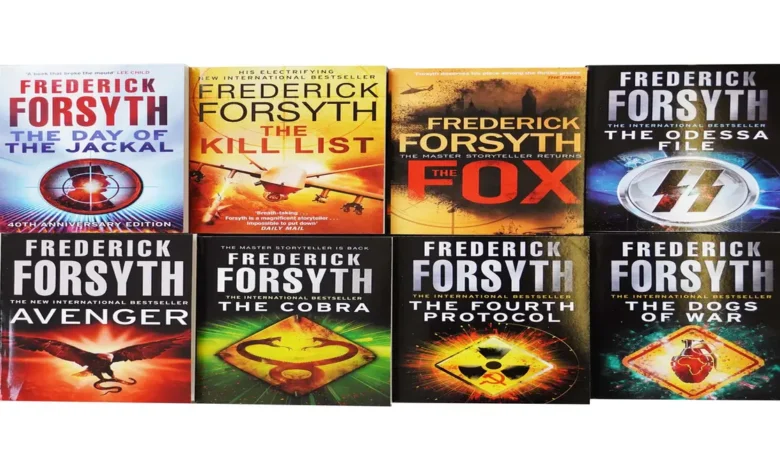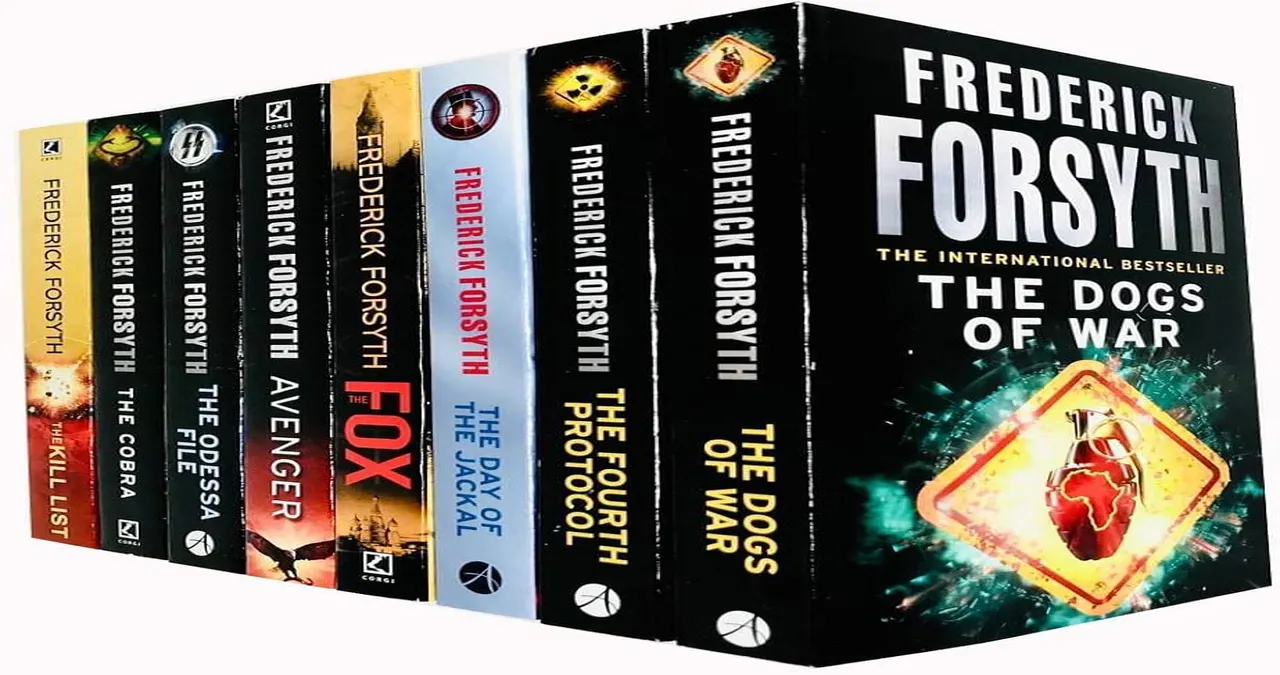Frederick Forsyth Best Books: A Deep Dive into the Mind of a Thriller Genius

Frederick Forsyth Best Books If you’re a fan of pulse-pounding suspense, globe-trotting adventures, and sharply drawn political intrigue, there’s a good chance you’ve come across the legendary works of Frederick Forsyth. With a career that spans decades and a bibliography filled with timeless thrillers, Forsyth stands tall as a titan of the genre. His books don’t just entertain; they challenge the mind, explore global power plays, and introduce us to characters that feel all too real. Whether you’re a longtime reader or just discovering his works, diving into Frederick Forsyth’s best books is like stepping into a world where fiction blurs seamlessly with reality.
Forsyth isn’t just an author; he’s an institution. With a background in journalism and espionage, he brings a uniquely authentic voice to his storytelling. His meticulous research and real-world experience are evident on every page, making his books not just exciting but also intellectually satisfying. So, if you’re wondering where to start or which of his novels deserve a permanent spot on your shelf, this comprehensive guide is for you. We’ll journey through his finest works, explore what makes them iconic, and give you everything you need to understand why Forsyth remains a master storyteller.
Frederick Forsyth Best Books: The Genius Behind the Pen: Who Is Frederick Forsyth?
Frederick Forsyth isn’t your average thriller writer. Born in Ashford, Kent, England, he started his career as a journalist before becoming a novelist. His time with Reuters and the BBC exposed him to the intricacies of global politics and warfare, which would later serve as a deep well of inspiration for his fiction. Before that, he served in the Royal Air Force as a pilot, giving him first-hand knowledge of the military world that he so often depicts with uncanny accuracy in his books.
His transition into fiction wasn’t planned but rather born of necessity. With limited funds and a desire to write, he sat down and penned “The Day of the Jackal,” a novel that would become a cultural phenomenon. His background in investigative journalism, combined with his experiences in conflict zones, gave him the tools to craft stories that feel frighteningly real. Forsyth’s deep dives into political plots, espionage networks, and military operations are not just impressive they’re deeply compelling.
What makes Forsyth stand out isn’t just the action or suspense; it’s the way he grounds his narratives in reality. His books are well-researched, often drawing from true events and real geopolitical tensions. Readers come away from his work not just entertained but also educated. This rare blend of fact and fiction is why many consider Frederick Forsyth’s best books to be not only thrilling reads but essential ones.
The Day of the Jackal: A Thriller Masterpiece
If there’s one book that catapulted Frederick Forsyth to literary stardom, it’s “The Day of the Jackal.” This gripping novel is often cited as one of the greatest thrillers of all time, and for good reason. The story centers around a fictional plot to assassinate French President Charles de Gaulle, meticulously orchestrated by a mysterious hitman known only as “The Jackal.”
What sets this book apart is Forsyth’s incredible attention to detail. He doesn’t just tell you what’s happening; he shows you how it’s done. The planning, the travel, the documentation—every step the Jackal takes feels like something out of a classified intelligence file. Forsyth uses his journalistic background to layer the story with authenticity, making readers feel like they’re right in the middle of a covert operation.
Despite knowing the historical outcome that de Gaulle was never assassinated Forsyth manages to maintain nail-biting suspense. It’s a testament to his storytelling prowess. The interplay between the assassin and the French authorities tasked with stopping him creates a cat-and-mouse game that’s as intellectual as it is thrilling. It’s not just a story about an assassination attempt; it’s a story about obsession, intelligence, and human resilience.
The Odessa File: Uncovering Hidden Evils
Hot on the heels of “The Day of the Jackal,” Forsyth delivered another stunning novel: “The Odessa File.” This time, the story shifts from assassination plots to post-war Germany, where a young journalist stumbles upon a secret Nazi organization known as ODESSA. The narrative delves deep into the shadows of history, exploring how remnants of the Third Reich sought to evade justice.
“The Odessa File” stands out for its blend of historical fiction and investigative drama. Forsyth expertly weaves together past atrocities with present-day intrigue, creating a narrative that is both educational and engaging. The protagonist’s pursuit of truth leads him into a dangerous web of lies, making the reader question just how much of history remains hidden in plain sight.
What makes this one of Frederick Forsyth’s best books is the way it makes readers think. Beyond the suspense and action, the novel forces us to confront uncomfortable truths about the post-war world. Forsyth doesn’t shy away from moral complexity, and that’s what gives this book its lasting impact.
The Dogs of War: A Mercenary’s Tale
“The Dogs of War” is another must-read in the Forsyth catalog. It dives into the murky world of mercenaries, corporate greed, and African politics. The story follows a band of hired guns who are contracted to stage a coup in a fictional African nation, all for the sake of mineral rights and corporate profit.
What makes this book compelling is its realistic portrayal of how business interests can influence global politics. Forsyth doesn’t romanticize the mercenaries or their employers; he presents them as complex figures caught in a morally ambiguous world. The novel is rich with logistical detail, from the planning of the coup to the procurement of weapons, making it a fascinating read for anyone interested in the mechanics of modern warfare.
It’s also a story about loyalty, betrayal, and survival. The characters aren’t just soldiers of fortune; they’re human beings with motives, flaws, and ethical dilemmas. This depth of character is part of what elevates “The Dogs of War” among Frederick Forsyth’s best books.
The Fist of God: Espionage in the Gulf War
Jumping into the early ’90s, “The Fist of God” brings us to the heart of the Gulf War. It follows a British intelligence officer on a mission to uncover Saddam Hussein’s secret weapon. Like all of Forsyth’s novels, this one is grounded in meticulous research, blending fictional characters with real historical events.
What sets this book apart is its scale. It’s an epic tale that spans countries and intelligence agencies, all working against the clock to prevent a catastrophic war. Forsyth navigates this sprawling narrative with skill, never losing the thread or the reader’s interest.
The book is a masterclass in geopolitical storytelling. Forsyth pulls no punches when it comes to depicting the stakes involved in international espionage. The moral questions posed—about war, intelligence, and the human cost of political decisions—linger long after the final page is turned. It’s this depth that cements “The Fist of God” as one of Frederick Forsyth’s best books.
Icon: A Glimpse into Russia’s Future
“Icon” offers a chilling look at Russia’s political landscape in a post-Cold War world. The plot revolves around a former CIA operative who is called back into action to prevent a dangerous ultra-nationalist from taking power. Set against a backdrop of economic turmoil and political unrest, the novel feels eerily prescient.
Forsyth uses this platform to explore the fragility of democracy and the dangers of authoritarianism. The story is fast-paced, with plenty of twists and turns, but it never sacrifices substance for style. The characters are richly drawn, and the stakes couldn’t be higher.
“Icon” is one of those books that feels like it could happen tomorrow. Its relevance has only grown over the years, making it not just a thrilling read but a thought-provoking one. That blend of entertainment and insight is why it remains among Frederick Forsyth’s best books.
Avenger: Justice Beyond Borders
In “Avenger,” Forsyth tells the story of a Vietnam War veteran turned private investigator who is hired to track down a Serbian war criminal. The novel weaves together threads of justice, revenge, and international law, offering a compelling look at what happens when legal systems fail.
This book stands out for its emotional weight. While it has all the hallmarks of a Forsyth thriller—intelligence operations, global settings, intricate plotting—it also delves deep into personal loss and the human desire for justice. The protagonist isn’t just chasing a target; he’s confronting his past.
“Avenger” is a reminder that thrillers can be both exciting and meaningful. Forsyth’s ability to tackle complex moral issues without losing narrative momentum is a big reason why this novel is considered one of his best.

Quick Bio Table: Frederick Forsyth at a Glance
| Full Name | Frederick McCarthy Forsyth |
| Birthdate | August 25, 1938 |
| Birthplace | Ashford, Kent, England |
| Occupation | Author, Former Journalist, Former RAF Pilot |
| Genre | Thriller, Espionage, Political Fiction |
| Notable Works | The Day of the Jackal, The Odessa File, The Dogs of War |
| Awards | Edgar Award, Cartier Diamond Dagger |
| Fun Fact | Claimed to have worked as a spy for MI6 |
FAQs About Frederick Forsyth and His Best Books
What is considered Frederick Forsyth’s best book?
Most fans and critics agree that “The Day of the Jackal” is his best work. Its influence on the thriller genre is unparalleled, and it remains a benchmark for suspense novels.
Are Frederick Forsyth’s books based on true stories?
While his books are fiction, many are inspired by real events or include actual historical figures and organizations. Forsyth’s background in journalism gives his work an added layer of realism.
Do you need to read Forsyth’s books in order?
Not at all. Most of his novels are stand-alone stories, so you can jump in anywhere.
Which Frederick Forsyth book should I start with?
“The Day of the Jackal” is a great starting point. If you prefer something more modern, “Avenger” or “Icon” are excellent choices.
Is Frederick Forsyth still writing?
He announced his retirement from fiction writing but continues to write occasional pieces and remain active in the literary world.
Are there any film adaptations of his books?
Yes! “The Day of the Jackal,” “The Odessa File,” and “The Dogs of War” have all been adapted into films.
How does Forsyth compare to other thriller writers?
He’s often considered in the same league as John le Carré and Tom Clancy but is known for his journalistic approach and laser-focused attention to detail.
What makes Frederick Forsyth’s best books stand out?
It’s the blend of thrilling narrative, real-world insight, and meticulous research. Few authors can match his level of authenticity and engagement.
Can young readers enjoy Frederick Forsyth’s work?
While his books are not inappropriate, they are dense and detail-heavy, making them more suitable for mature readers who enjoy complex plots.
Is there a common theme in his best books?
Yes, most explore themes of justice, political intrigue, and moral complexity against the backdrop of global events.
